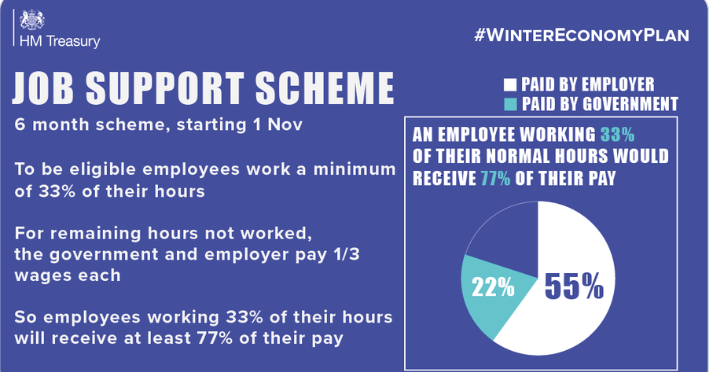The Job Support Scheme has been introduced to protect viable jobs in businesses who are facing lower demand over the winter months due to Covid-19. Below we answer some of the questions we are being asked by our clients:
1. What is the aim of the Job Support Scheme (JSS)?
The JSS is a new Government scheme that is designed to protect viable jobs in businesses who are facing lower demand over the winter months due to COVID-19. The aim of the scheme is to provide financial support to businesses “that are being impacted by Coronavirus and who can support their employees doing some work, but that need more time for demand to recover”.
2. When will the JSS start?
The scheme will run for six months from 1 November 2020 to 1 April 2021
3. How does the JSS work?
The JSS can be used to help pay the wages of employees working reduced hours, which must be at least one third of their normal hours.
It enables the Government and employer together to make up the pay to two-thirds of normal hours, with the Government and the employer each paying one third of the remaining unworked hours (subject to a cap on the Government contribution – see below).
This means an employee can work 33% of their normal hours and receive 77% of their pay, made up of 55% funded directly by their employer (33% + 22%) and 22% funded by the Government (which can then be claimed back by the employer).

It is important to note that while the JSS is to run for 6 months, the current requirement that the employee must work at least 33% of their usual hours will be reviewed by Government. This may mean that the minimum hours threshold to work 33% of normal hours may be reviewed after 3 month
4. Is there a cap on the Government’s contribution?
Yes. As previously stated, an employee will need to work a minimum of 33% of their usual hours. For every hour not worked, their employer and the Government will each pay one third of the employee’s unworked hours, and the Government’s contribution will be capped at £697.92 per month. This may mean that where the Government contribution has been capped, an employee may receive less than 77% of their normal pay.
5. Can employees work more than a third of their normal hours?
Yes. If employees work more than a third of their normal hours the JSS grant amount will be reduced as the unworked hours for which the grant can be claimed will be reduced. The Treasury Factsheet provides the illustrative example of:
| Hours Employee Worked | 33% | 40% | 50% | 60% | 70% |
| Hours Employee Not Working | 67% | 60% | 50% | 40% | 30% |
| Employee Earnings (% of normal) | 78% | 80% | 83% | 87% | 90% |
| Government Grant (% of normal wages) | 22% | 20% | 17% | 13% | 10% |
| Employer Cost (% normal wages) | 55% | 60% | 67% | 73% | 80% |
6. Is the JSS linked to the Coronavirus Job Retention Scheme (CJRS)?
No, they are separate schemes.
If the employer has previously used the CJRS, they can still use the new JSS and will still be able to claim the Jobs Retention Bonus in respect of those previously furloughed employees who are retained until at least 31 January 2021. Conversely, a business can sign up to the JSS even if they have not used the CJRS.
7. Which employers are eligible?
All UK employers with at least 250 employees (with a UK bank account and UK PAYE schemes) can use the JSS, and the gov.uk portal to start claiming will open on 1 December. Large employers will need to take a financial assessment test to show that their turnover has been impacted adversely by COVID-19, although it is presently unclear what the test will be. However, the Job Support Scheme factsheet states that the government expects that large employers will not be making capital distributions, such as dividends or share buybacks, if they participate in the Job Support Scheme.
We also await details of the Government’s definitions of small, medium and large employers for the purposes of the JSS.
8. Which employees are eligible?
Employees must be on an employer’s PAYE payroll on or before 23 September 2020. This means a Real Time Information (RTI) submission notifying payment to that employee to HMRC must have been made on or before 23 September 2020.
Employees must be on reduced hours (see below) but can move on and off the scheme as necessary. They do not have to be working the same pattern of work each month, but each short time working arrangement must cover a minimum period of seven days.
An employee cannot be made redundant or put on notice of redundancy during the period that their employer is claiming the JSS grant for that employee. This is an important difference to the CJRS (furlough scheme).
Please note that the Treasury Factsheet uses the term ’employees’. At this stage it is unclear whether ’employees’ is used as defined in the Employment Rights Act 1996 or whether it is intended to include the wider class of ‘workers’. It is highly likely to be the latter which is used under the CJRS.
9. What does it mean to be on reduced hours?
The employee must be working at least 33% of their usual hours – to be reviewed by Government who may increase this threshold in early 2021.
10. What does the grant cover?
For every hour not worked by the employee, both the Government and employer will pay a third each of the ‘usual hourly wage’ for that employee.
The government will cap their contribution at £697.52 a month per employee and employers will need to pay National Insurance and pension contributions as normal. Employees must work for at least a third of their usual hours for the first three months of the scheme.
11. What are ‘usual wages’?
The Government Factsheet on the JSS states that the ‘usual wages’ calculations will follow a similar process to the CJRS. Full details will be provided in future guidance. Employees who have previously been furloughed, will have their underlying usual pay and/or hours used to calculate usual wages, not the amount they were paid whilst on furlough.
It remains unclear at the moment what the reference point for ‘usual wages’ will be. The CJRS used pay based on a 19 March 2020 reference date. But the eligibility date for the JSS is 23 September 2020. Further guidance will hopefully address this issue.
12. Can employers claiming the JSS grant top-up employee wages?
No. Unlike the CJRS, the JSS factsheet makes clear that the Government’s “expectation is that employers cannot top up their employees’ wages above the two-thirds contribution to hours not worked at their own expense” and therefore this is not permitted.
13. What about those on leave?
It is unclear at the moment as to how the JSS will apply in relation to those on maternity and other forms of family- related leave or sick leave/self-isolating.
14. Can the JSS grant be claimed before paying the employees’ wages?
No, the employer will be reimbursed in arrears for the Government contribution, and the portal to start the claims process will open on the gov.uk website on 1 December.
The arrears claims process is a key difference to the CJRS and will be an important cash flow concern for employers.
15. How can an employer claim?
Employers will be able to make a claim online through gov.uk website from 1 December 2020.
Grants will be paid on a monthly basis. Grants will be payable in arrears meaning that a claim can only be submitted in respect of a given pay period, after payment to the employee has been made and that payment has been reported to HMRC via an RTI return.
16. Will HMRC run checks?
Yes, HMRC have announced that they will be checking claims, and that payments may be withheld or need to be paid back if a claim is found to be fraudulent or was based on incorrect information. Grants for the JSS can only be used as reimbursement for wage costs actually incurred.
As was required under the CJRS, employers must agree the new short-time working arrangements with their staff, make any changes to the employment contract by agreement, and notify the employee in writing (which can be an email). This agreement must be made available to HMRC on request.
We will provide further updates once more detail on the JSS is available.







